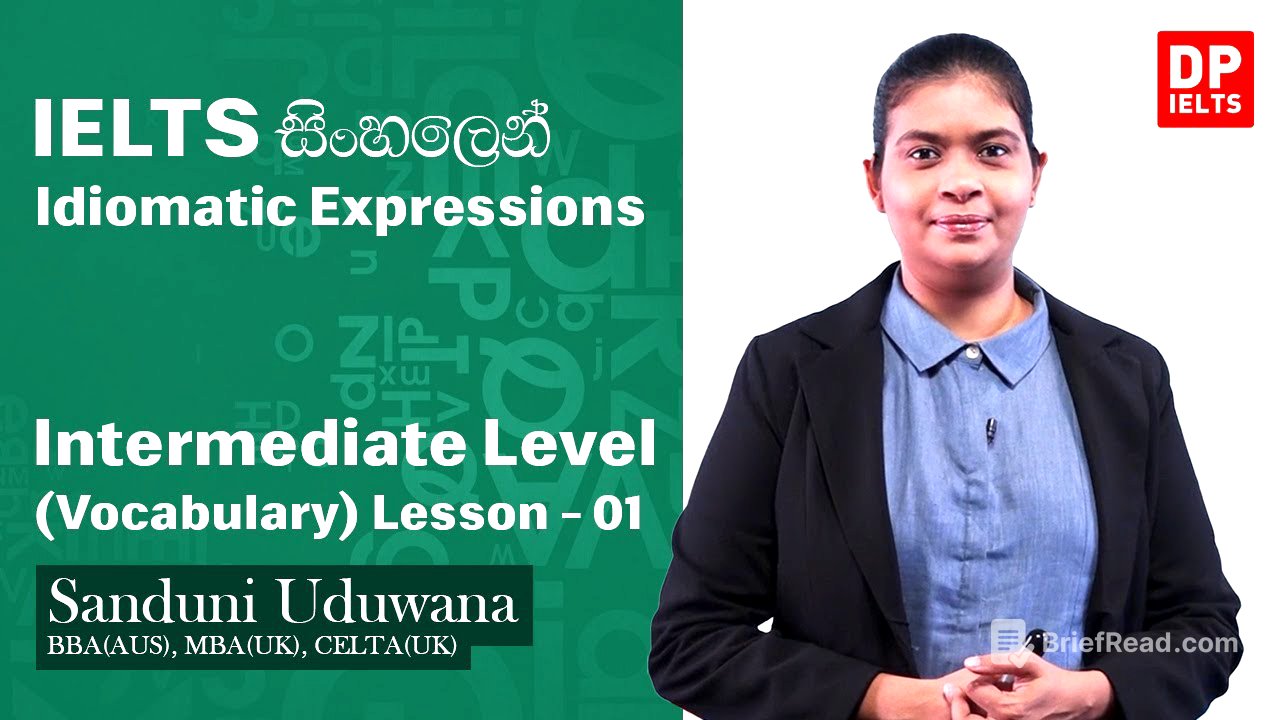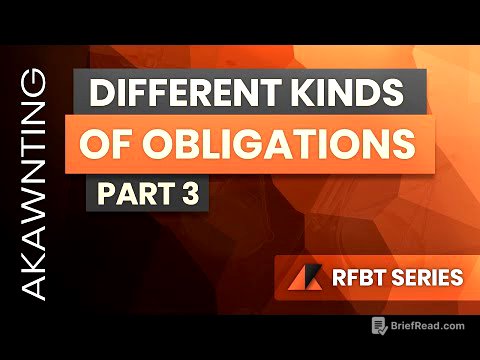TLDR;
This lesson focuses on idiomatic expressions, which are important for the IELTS speaking test. The video explains the meaning and usage of various common idioms, providing context and examples to help viewers understand how to use them correctly. The lesson covers idioms related to understanding, talents, money, stress, relationships, and everyday situations.
- Idiomatic expressions are important for the IELTS speaking test.
- Idioms have different meanings than their literal interpretations.
- The lesson covers a variety of common idioms with examples.
Introduction to Idiomatic Expressions [0:08]
The lesson introduces idiomatic expressions as a key component of vocabulary for the IELTS exam, particularly the speaking section. Knowing and using idioms can improve your score as it's part of the marking criteria. While there are many idioms, learning even a few can be beneficial.
List of Idiomatic Expressions [2:09]
The video presents a list of idiomatic expressions that will be explained in detail: "get the message," "green thumb," "money to burn," "take it easy," "in the dog house," "out of circulation," "hit the jackpot," "eat like a horse," "curiosity killed the cat," "snake in the grass," "don't be a chicken," "let sleeping dogs lie," "pop the question," "number one," "monkey business," "24/7," "lucky dog," "dead to the world," "puppy love," and "flat broke."
Get the Message [5:09]
"Get the message" means to understand something that someone is trying to communicate, even if they are not expressing it clearly. It's a casual way to ask if someone understood the underlying meaning of a conversation or explanation. This idiom is not related to receiving a text message.
Green Thumb [8:49]
"Green thumb" refers to having a natural talent for growing plants. It means someone is good at gardening and has a knack for making plants, vegetables, or flowers thrive. The idiom doesn't literally mean having a green-colored thumb.
Hit the Jackpot [11:19]
"Hit the jackpot" means achieving something big, like winning a lot of money or getting a dream job. It implies obtaining something of great value and is often associated with happiness and satisfaction.
Let Sleeping Dogs Lie [12:36]
"Let sleeping dogs lie" means to avoid interfering with a problem or situation because getting involved might make it worse. It advises against stirring up trouble and suggests leaving things as they are.
Money to Burn [14:05]
"Money to burn" means having more money than one needs and spending it freely on non-essential things like shopping or traveling. It implies having excess money and spending it without much control. It doesn't literally mean burning money.
Puppy Love [15:36]
"Puppy love" refers to the infatuation or love experienced at a very young age. It describes a young, innocent, and often unserious form of love, characterized by simple interactions like talking, messaging, or calling.
Take It Easy [16:49]
"Take it easy" means to relax, not stress, and avoid putting too much pressure on oneself. It advises being calm and neutral while working, rather than being hyper or angry.
24/7 [17:56]
"24/7" means doing something always or all the time, any time of the day. It implies that someone is constantly working or busy, more than the required amount. It doesn't literally mean working 24 hours a day, seven days a week, but rather that the person is doing something a lot.
In the Dog House [20:45]
"In the dog house" means being in a situation where someone is really angry at you, often because you did something wrong, like forgetting a birthday. It implies that you are likely to be scolded. It doesn't literally mean being inside a dog house.
Out of Circulation [22:43]
"Out of circulation" means no longer in use, often referring to policies, coins, or notes that are no longer valid or accepted. It implies that something is completely out of use and will not return.
Lucky Dog [23:39]
"Lucky dog" means being a very lucky and fortunate person who gets whatever they want. It is used to describe someone who consistently experiences good fortune, such as getting a job after an interview or marrying their dream partner.
Number One [24:52]
"Number one" means always being first or the winner in whatever you do. It implies consistently achieving the desired first place.
Eat Like a Horse [25:34]
"Eat like a horse" means eating a lot. It implies consuming large quantities of food.
Pop the Question [26:18]
"Pop the question" means to ask an important question, often a proposal of marriage. It encourages someone to express what's on their mind and not be afraid to ask.
Don't Be Chicken [28:08]
"Don't be chicken" means don't be afraid. It encourages someone to overcome their fear and take action.
Snake in the Grass [28:49]
"Snake in the grass" refers to a vicious person who appears friendly but is actually harmful or backstabbing. It describes someone whose true, negative characteristics are hidden.
Curiosity Kills the Cat [30:22]
"Curiosity kills the cat" means that being too inquisitive or wanting to know too many details can lead to trouble.
Dead to the World [31:00]
"Dead to the world" describes someone who appears to be of no use or unproductive. It implies that although they exist, they are not contributing anything useful.
Monkey Business [31:42]
"Monkey business" refers to doing things underhand or being mischievous and dishonest. It implies a lack of openness and honesty in one's actions.
Flat Broke [32:57]
"Flat broke" means having no money at all, being penniless.
Conclusion [33:28]
The lesson concludes by reiterating the importance of idiomatic expressions for the IELTS speaking test and vocabulary enhancement.









